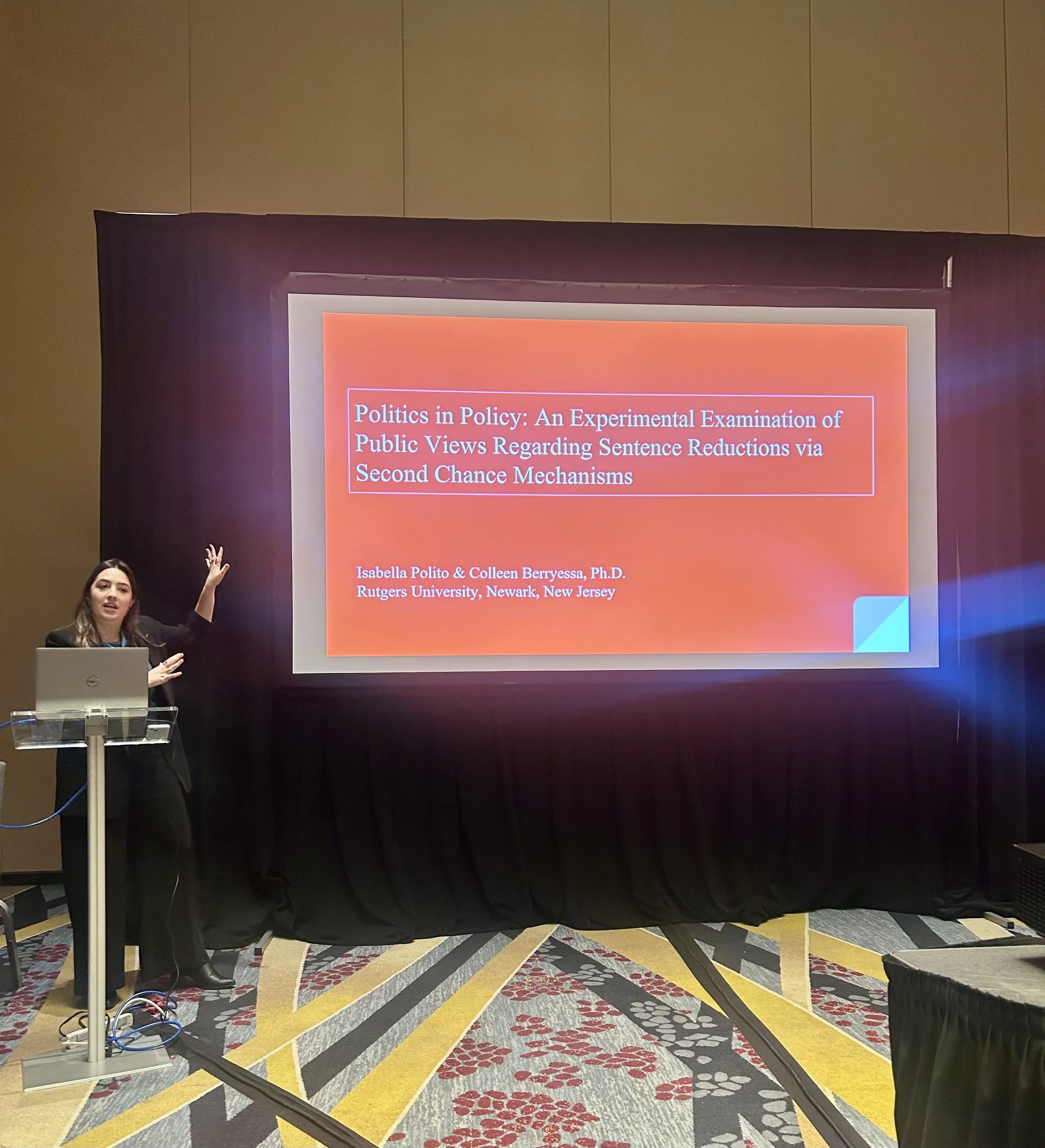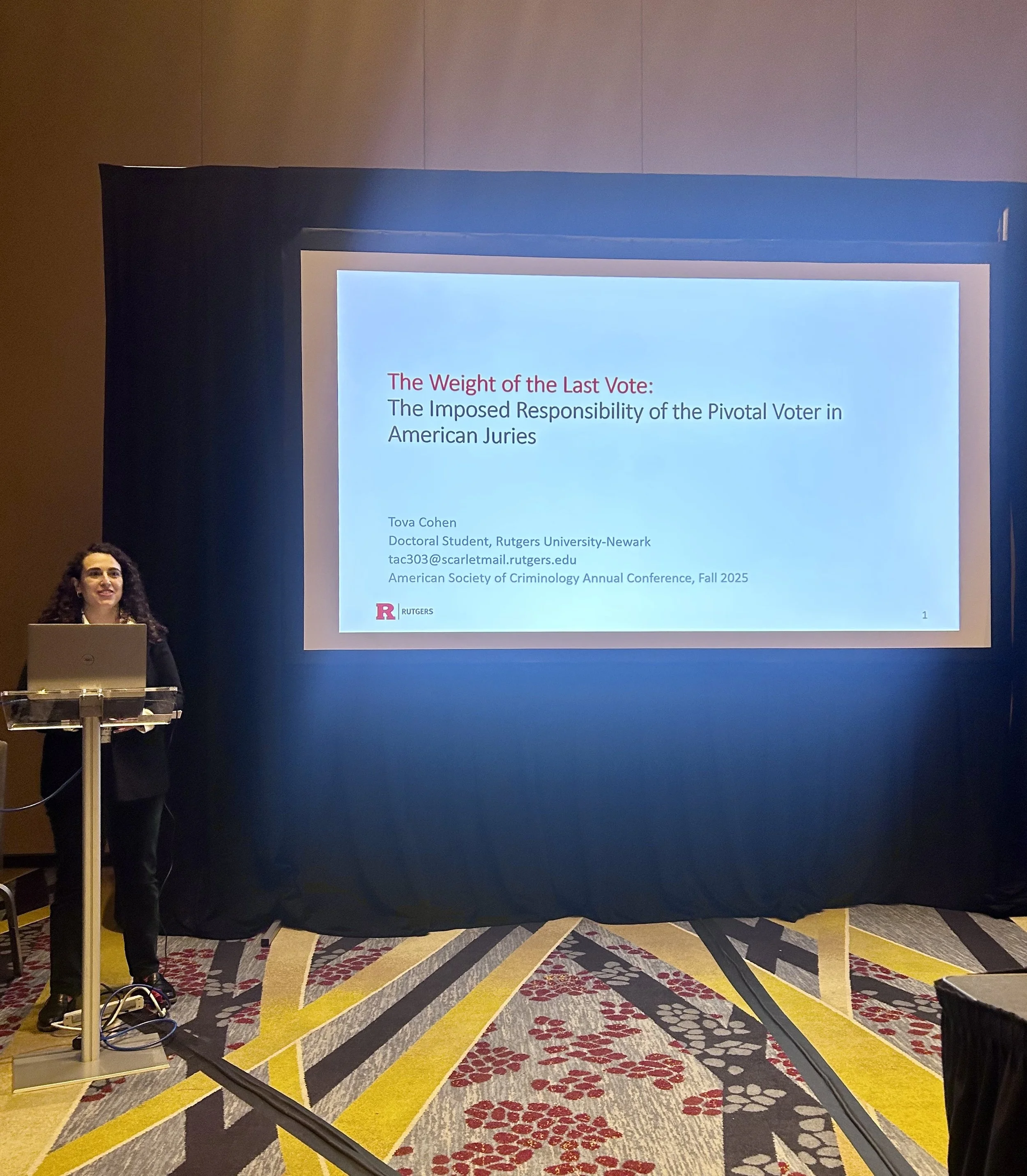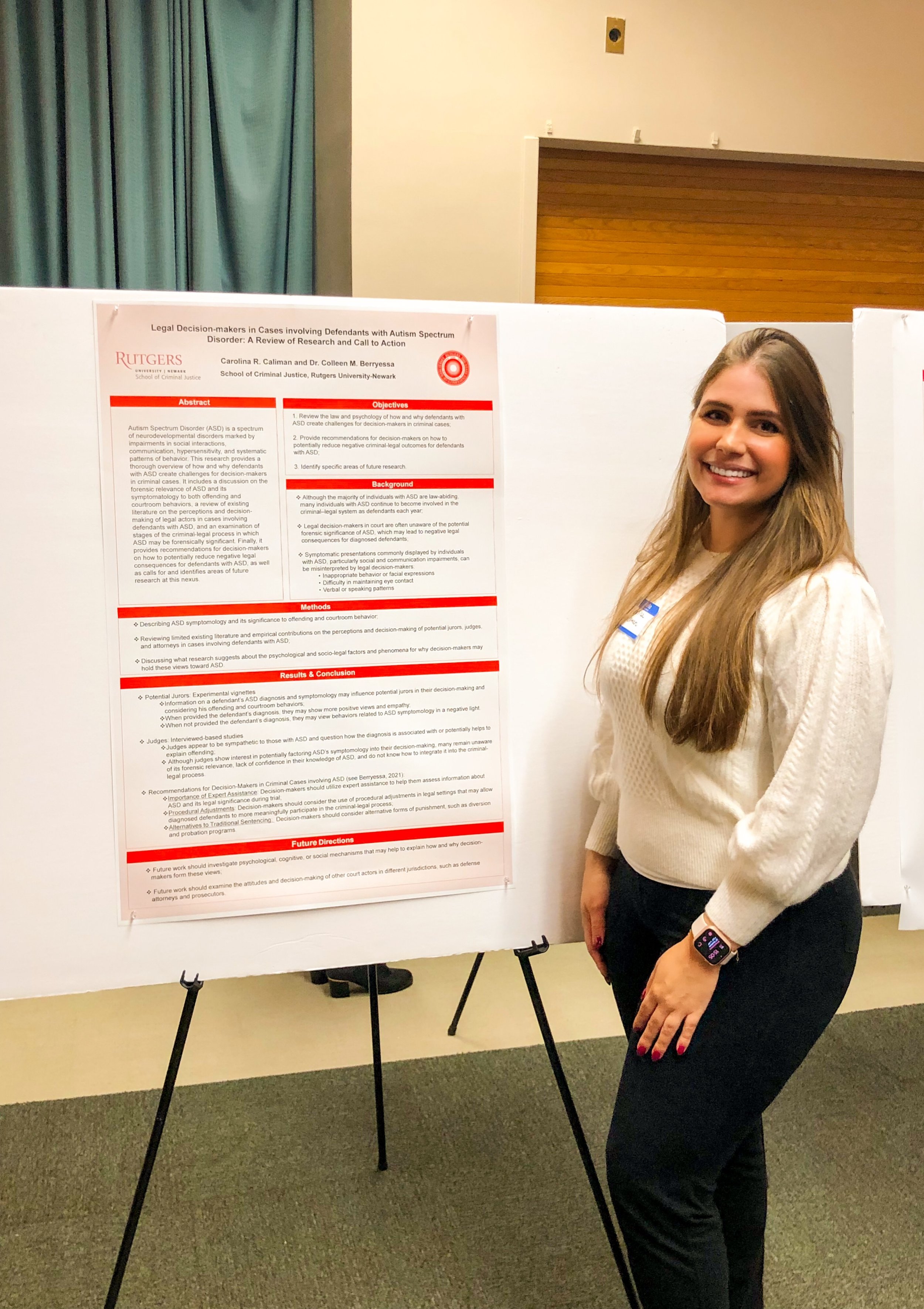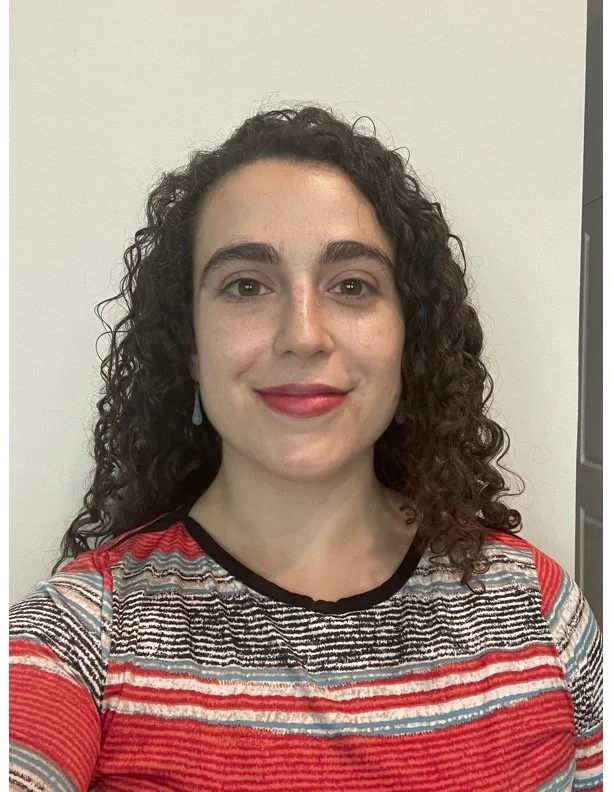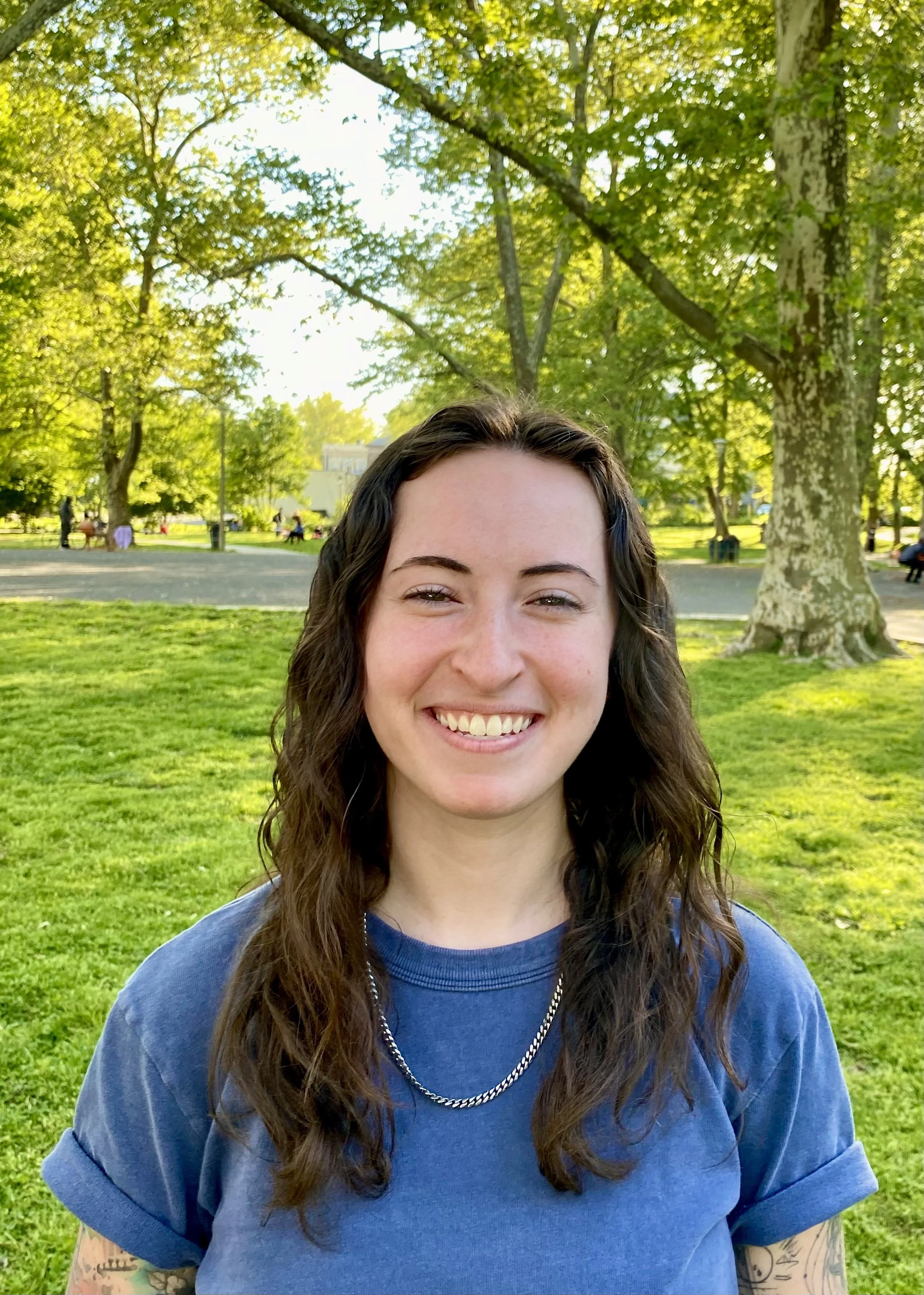The Berryessa Lab focuses on qualitative and quantitative research that considers how psychological processes, perceptions, attitudes, and social contexts affect the criminal justice system. If you are interested in learning more about our lab, please email colleen.berryessa@rutgers.edu.
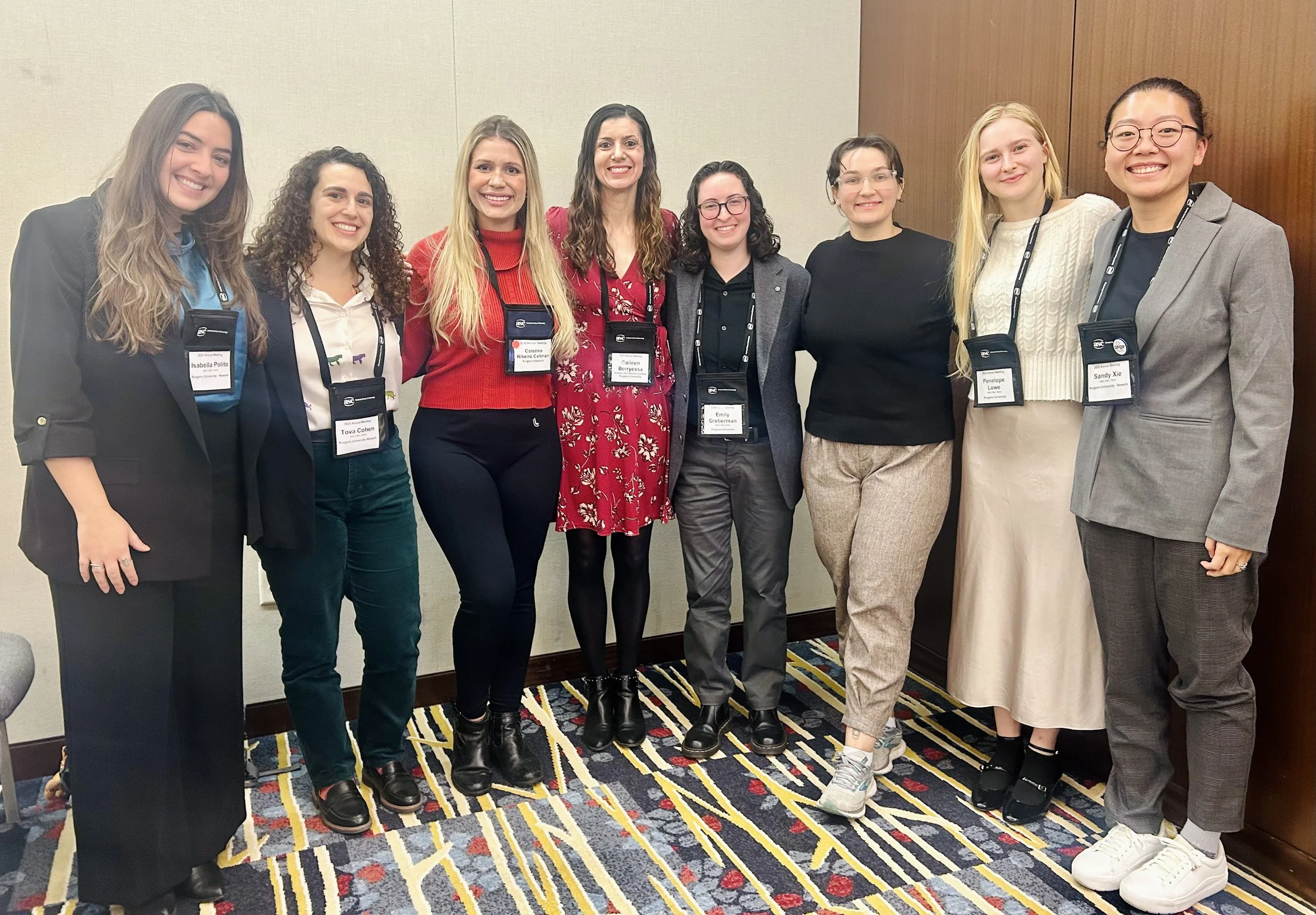
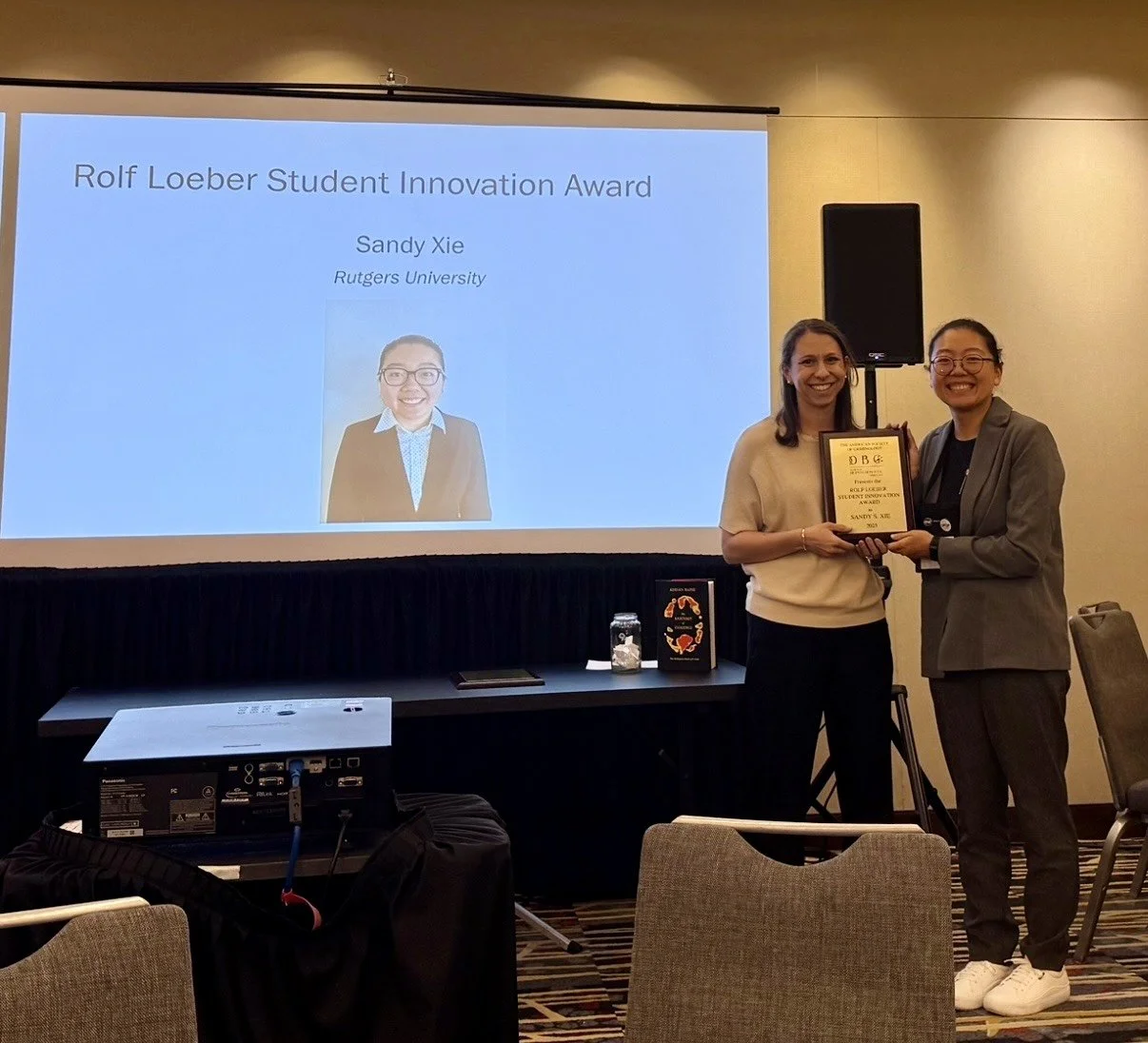
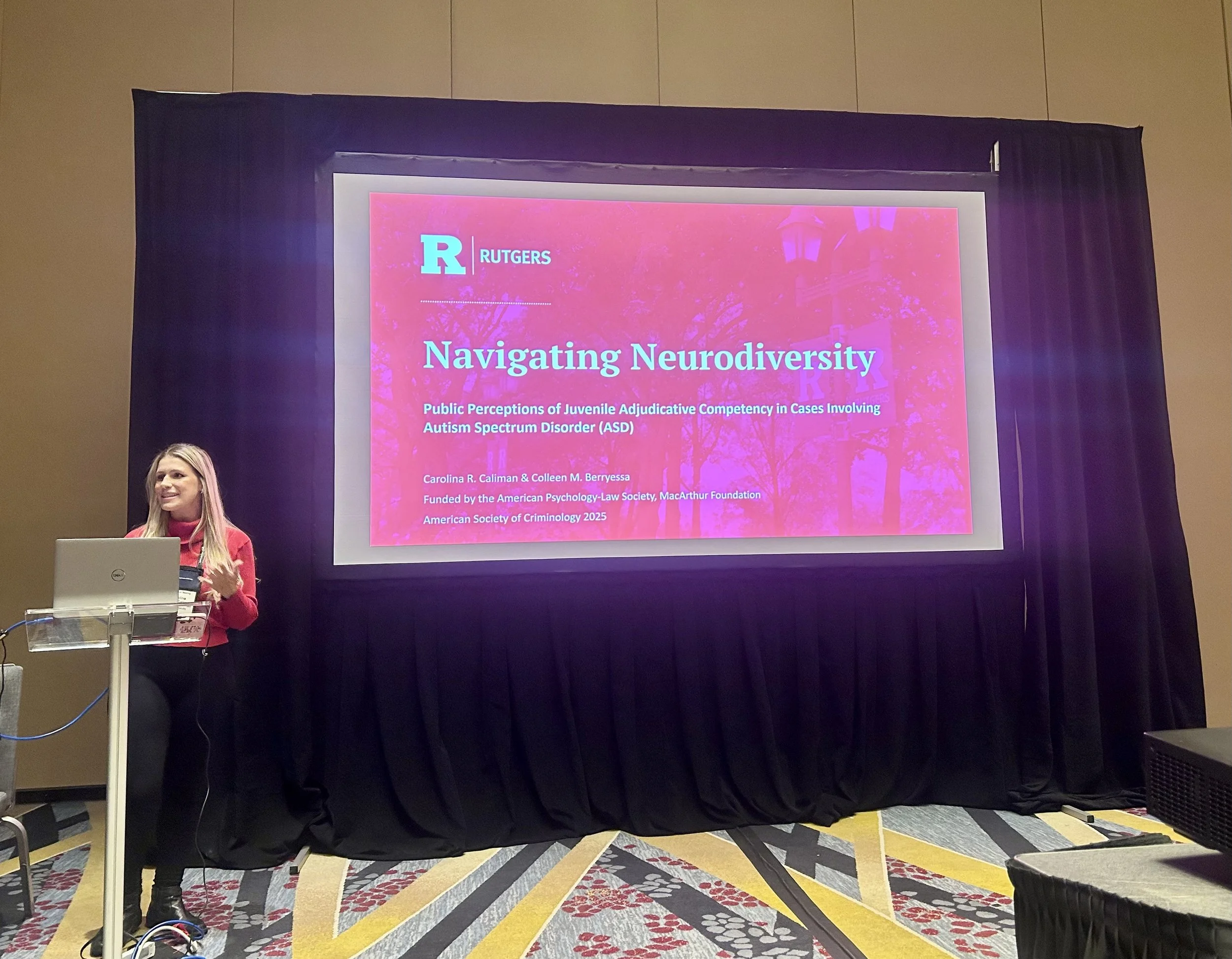
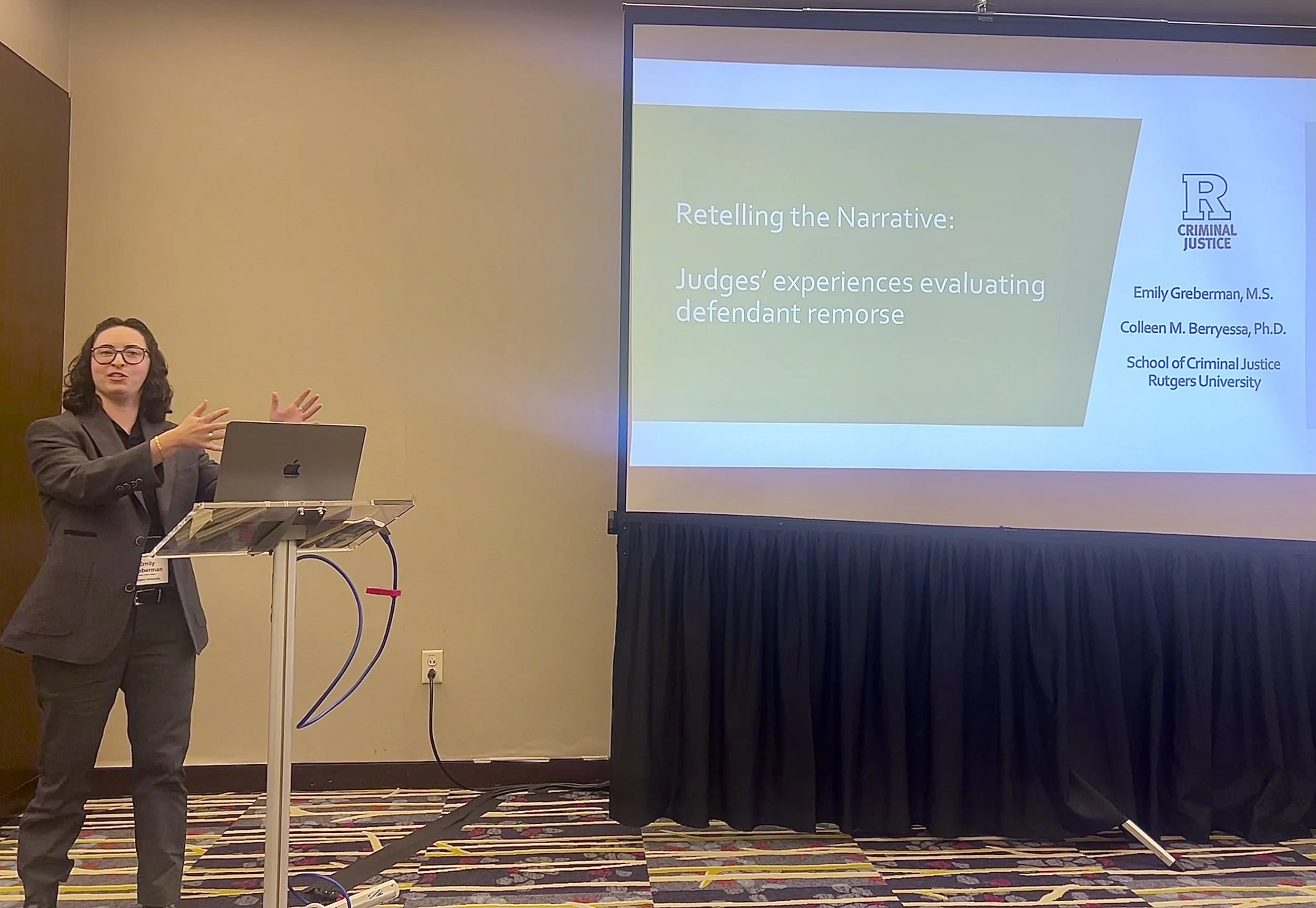
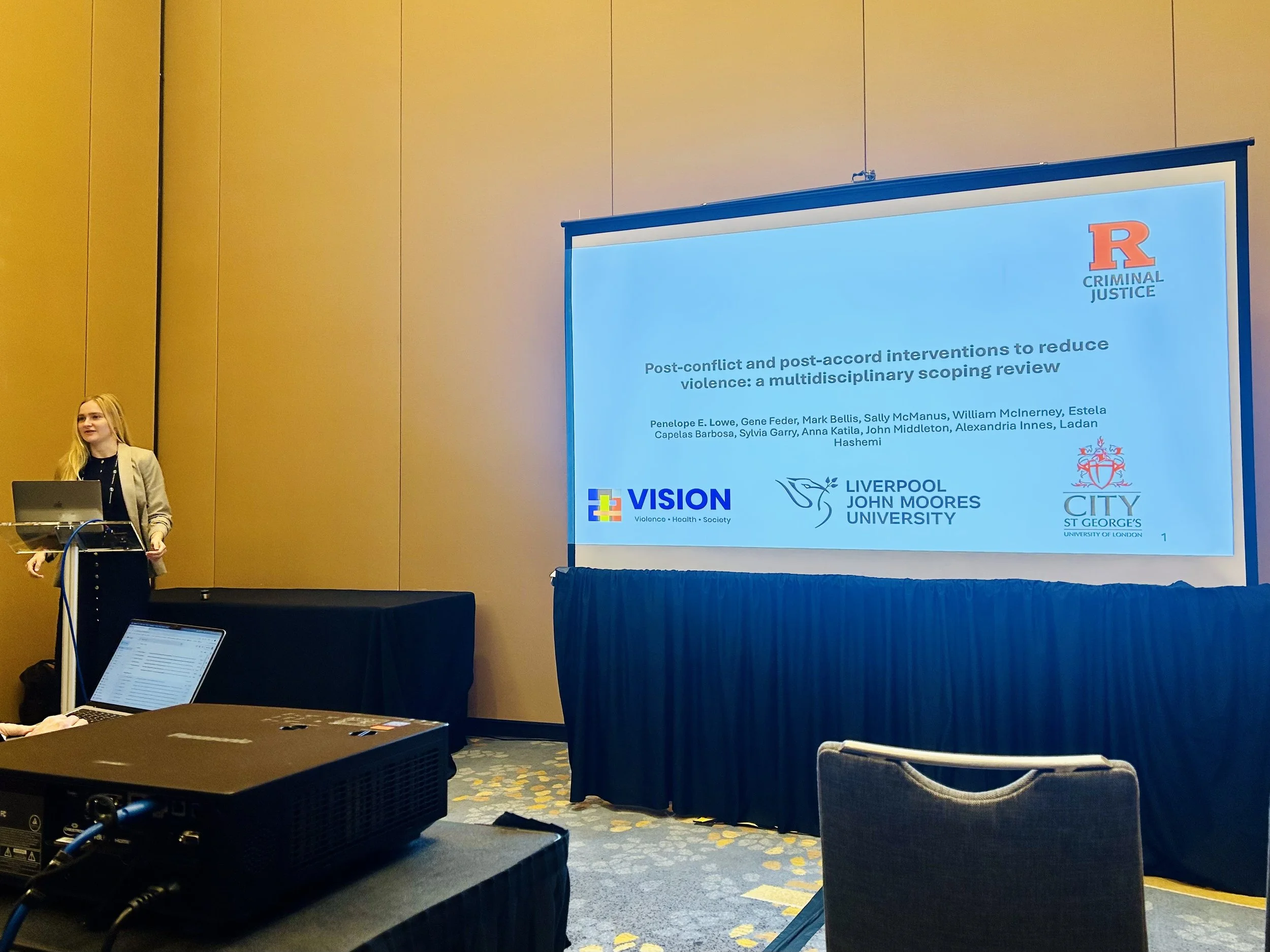
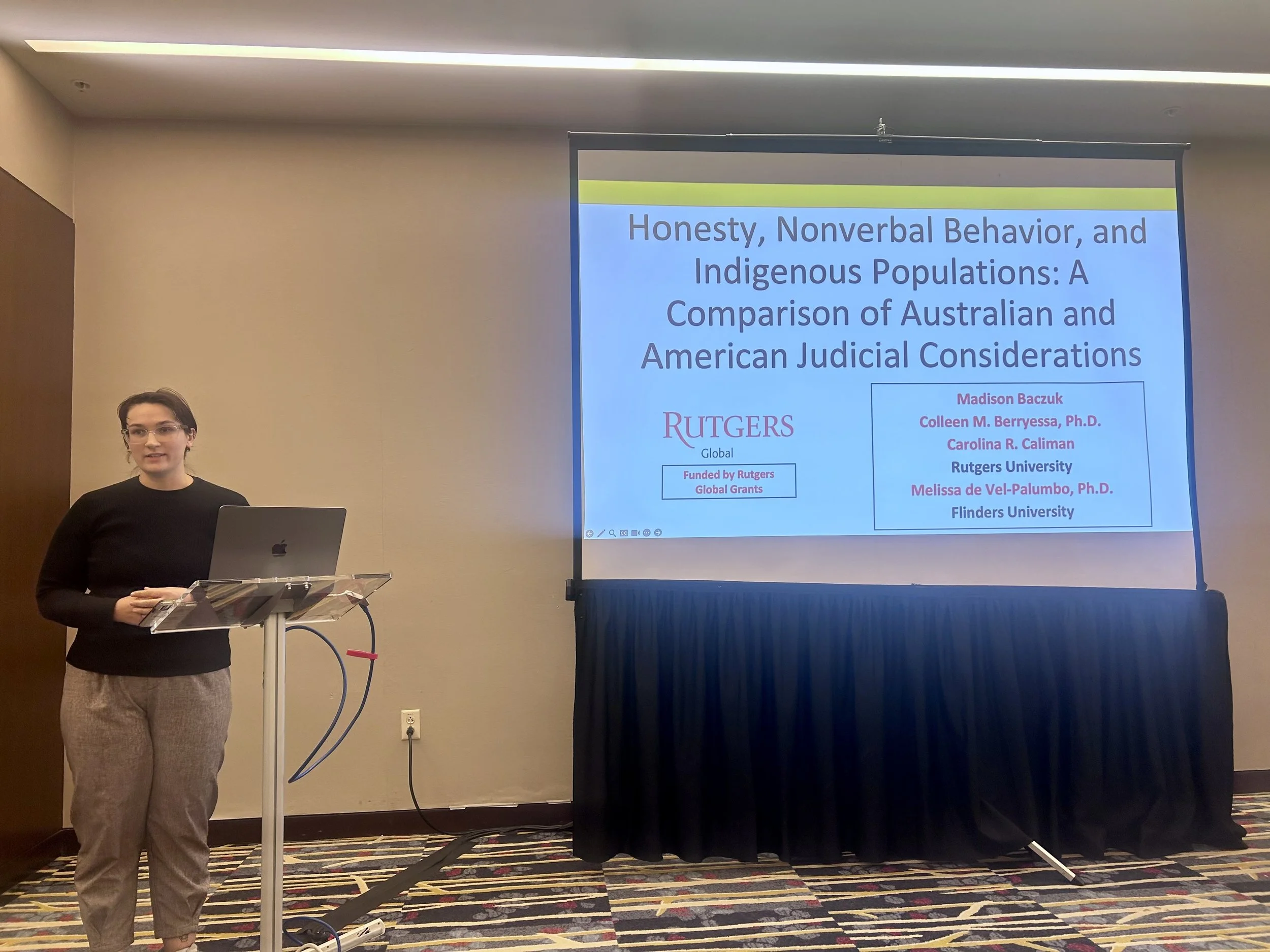
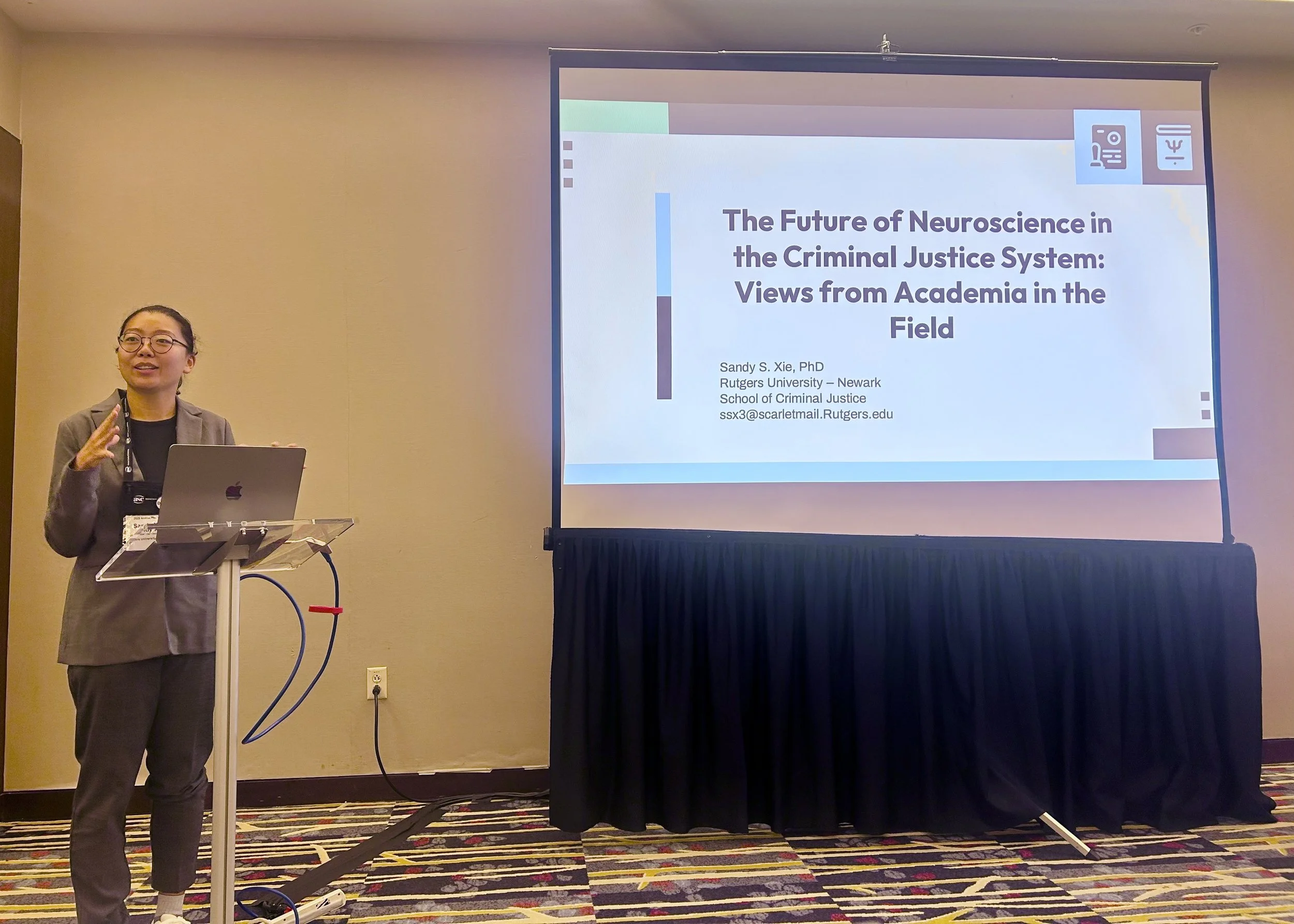





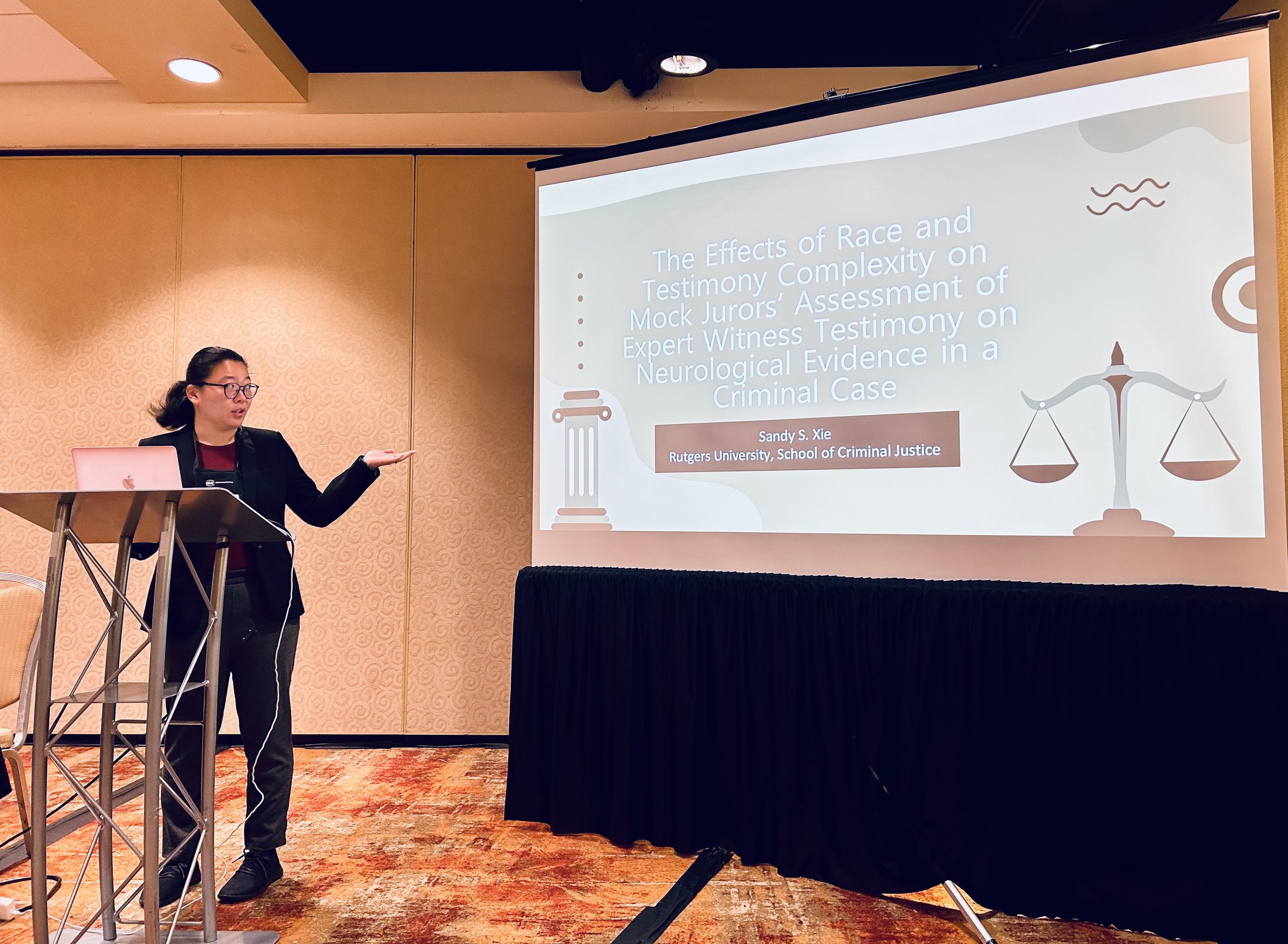
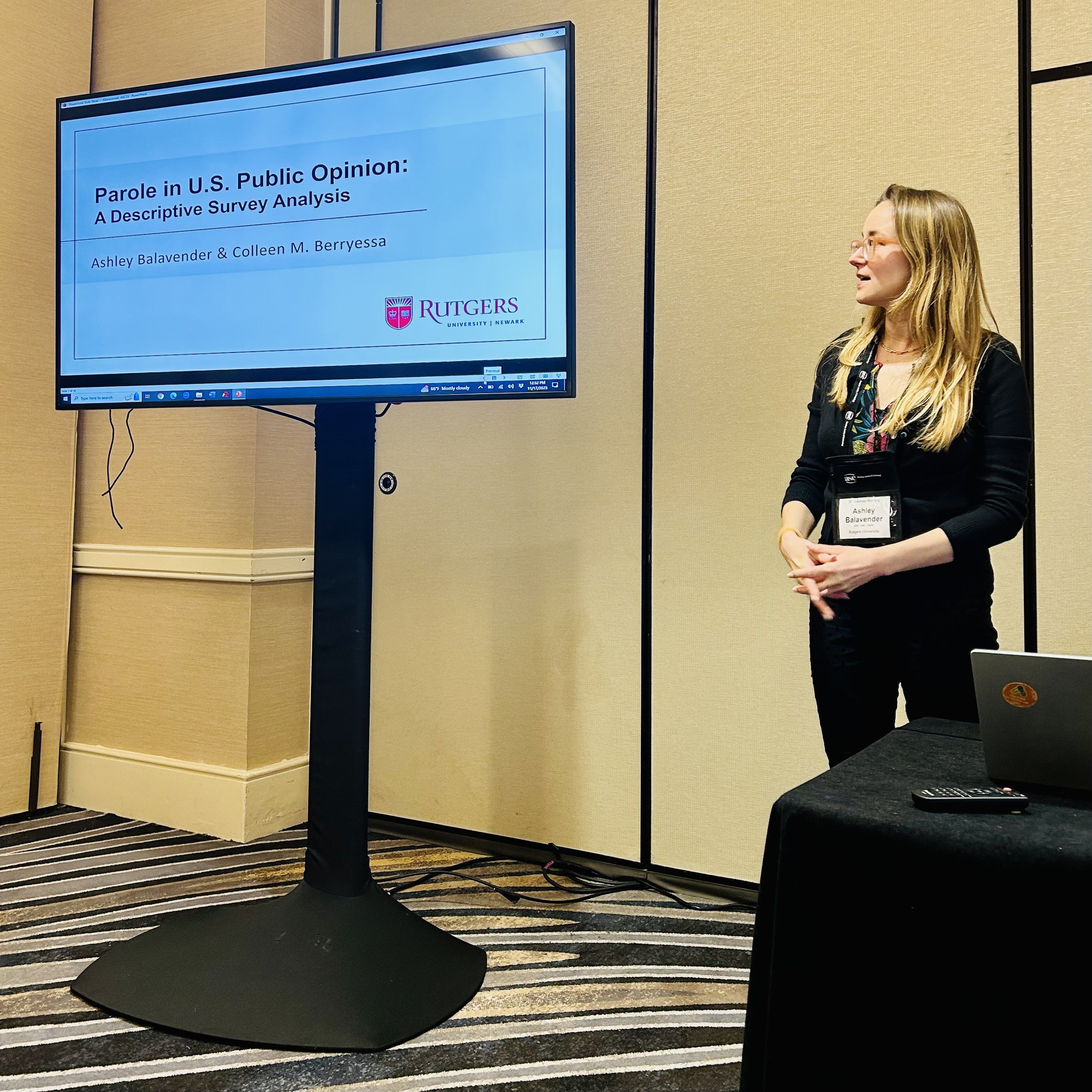

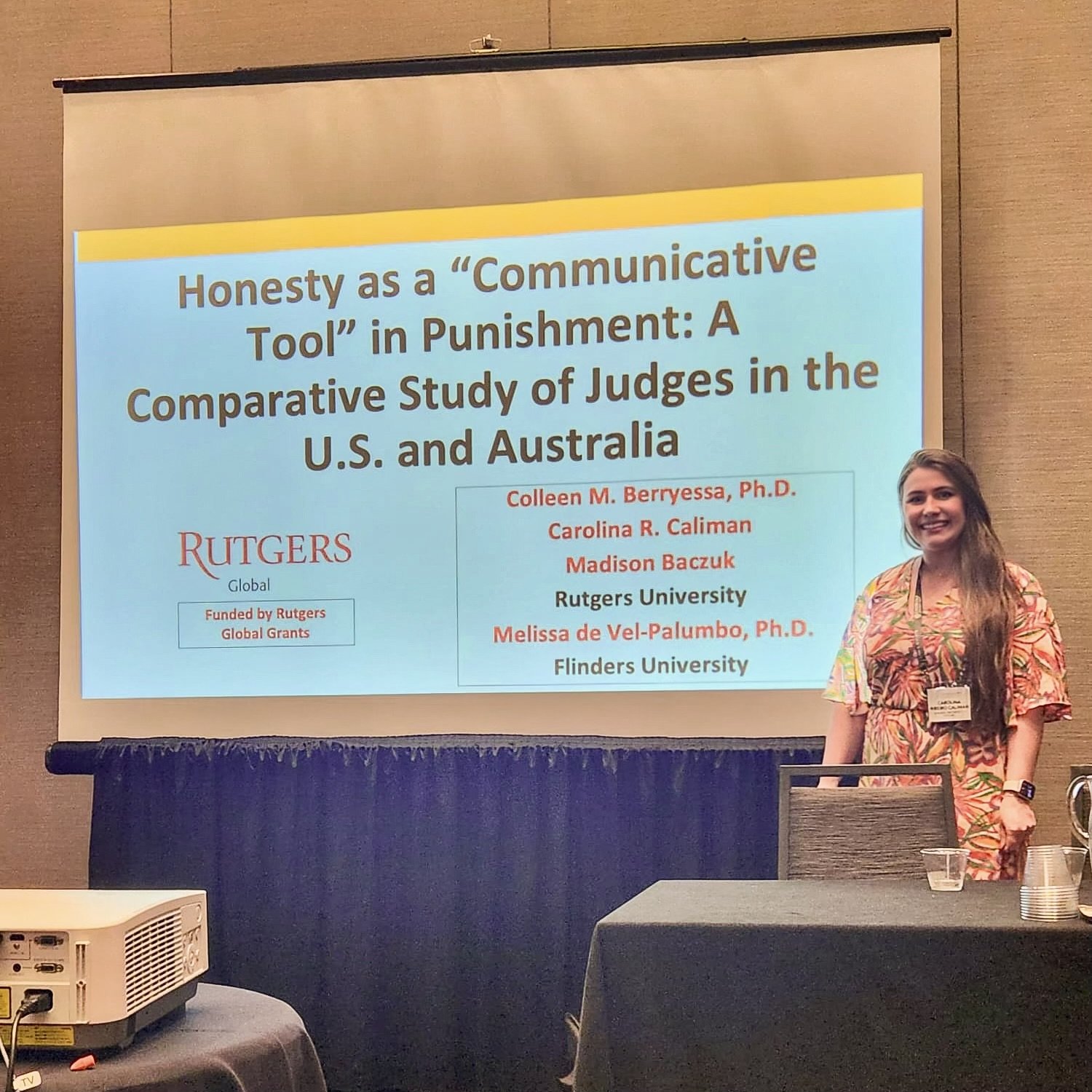
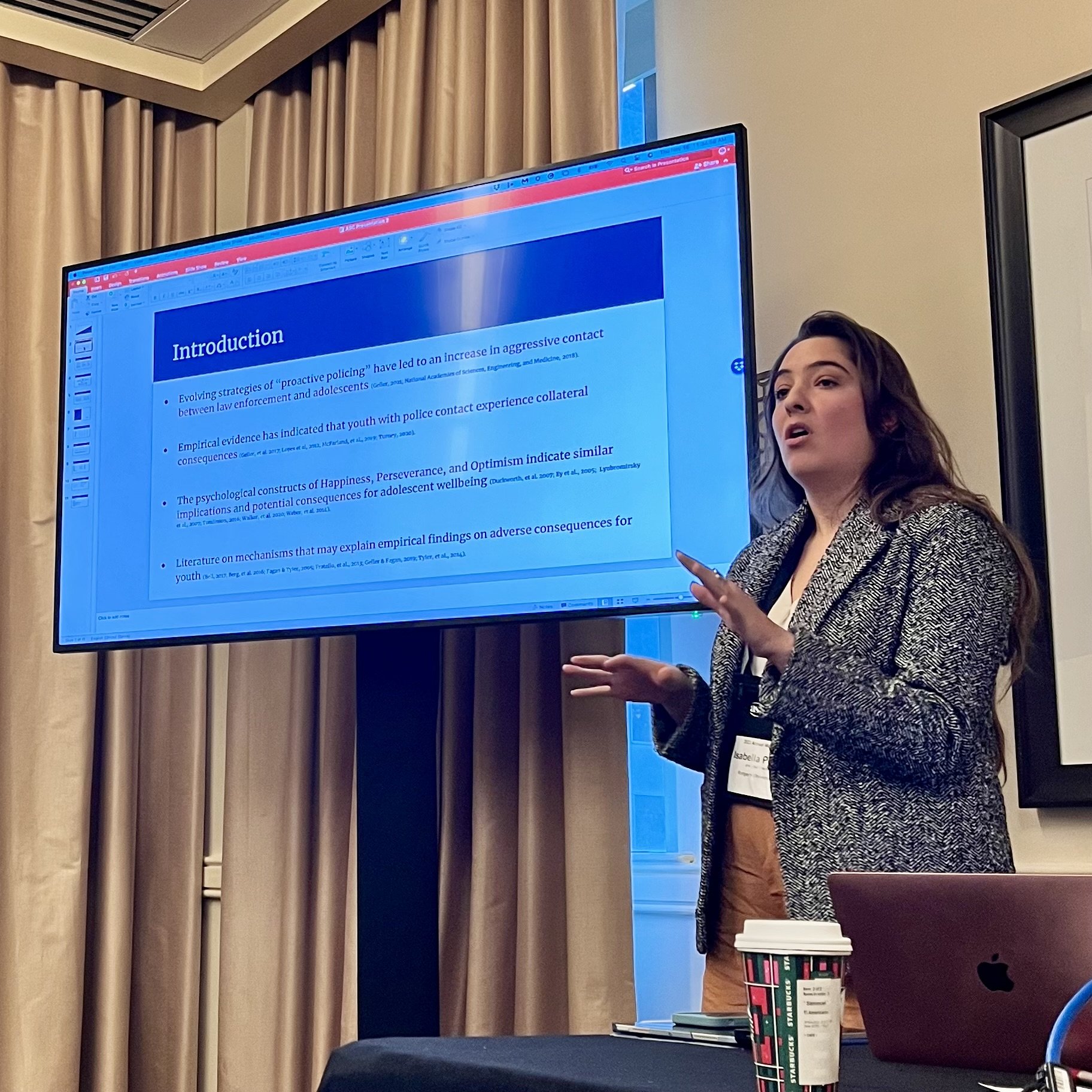



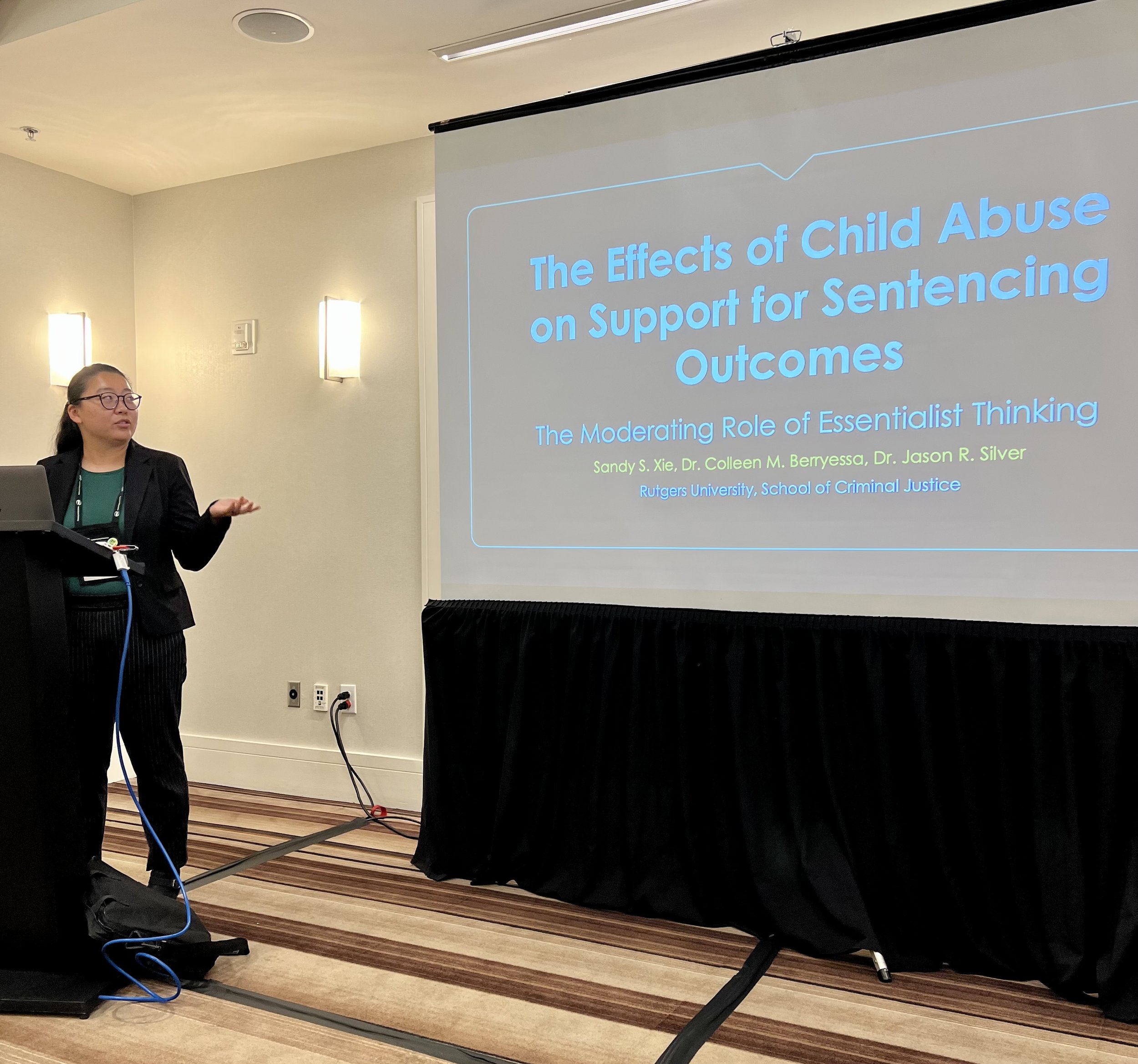

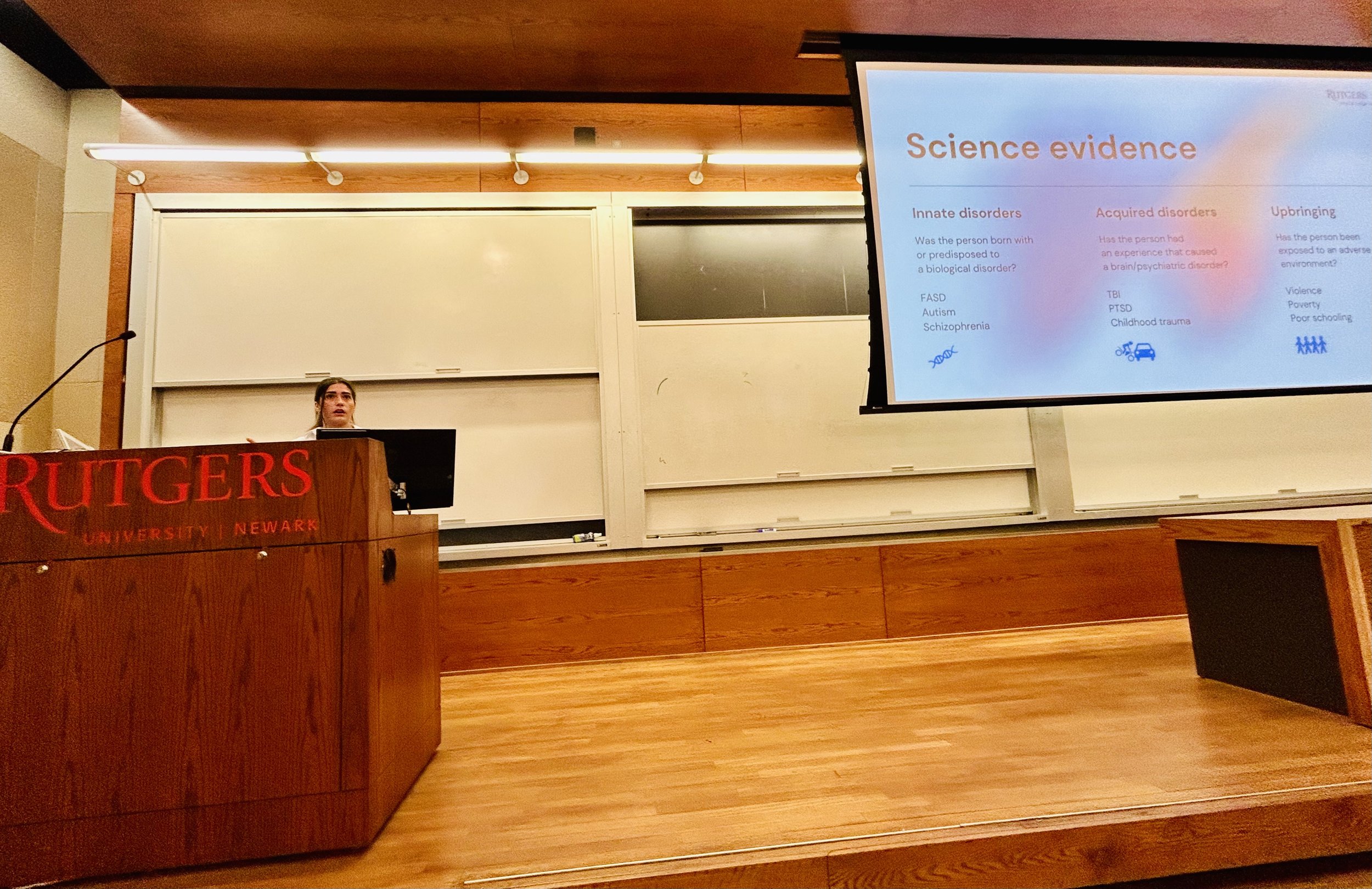

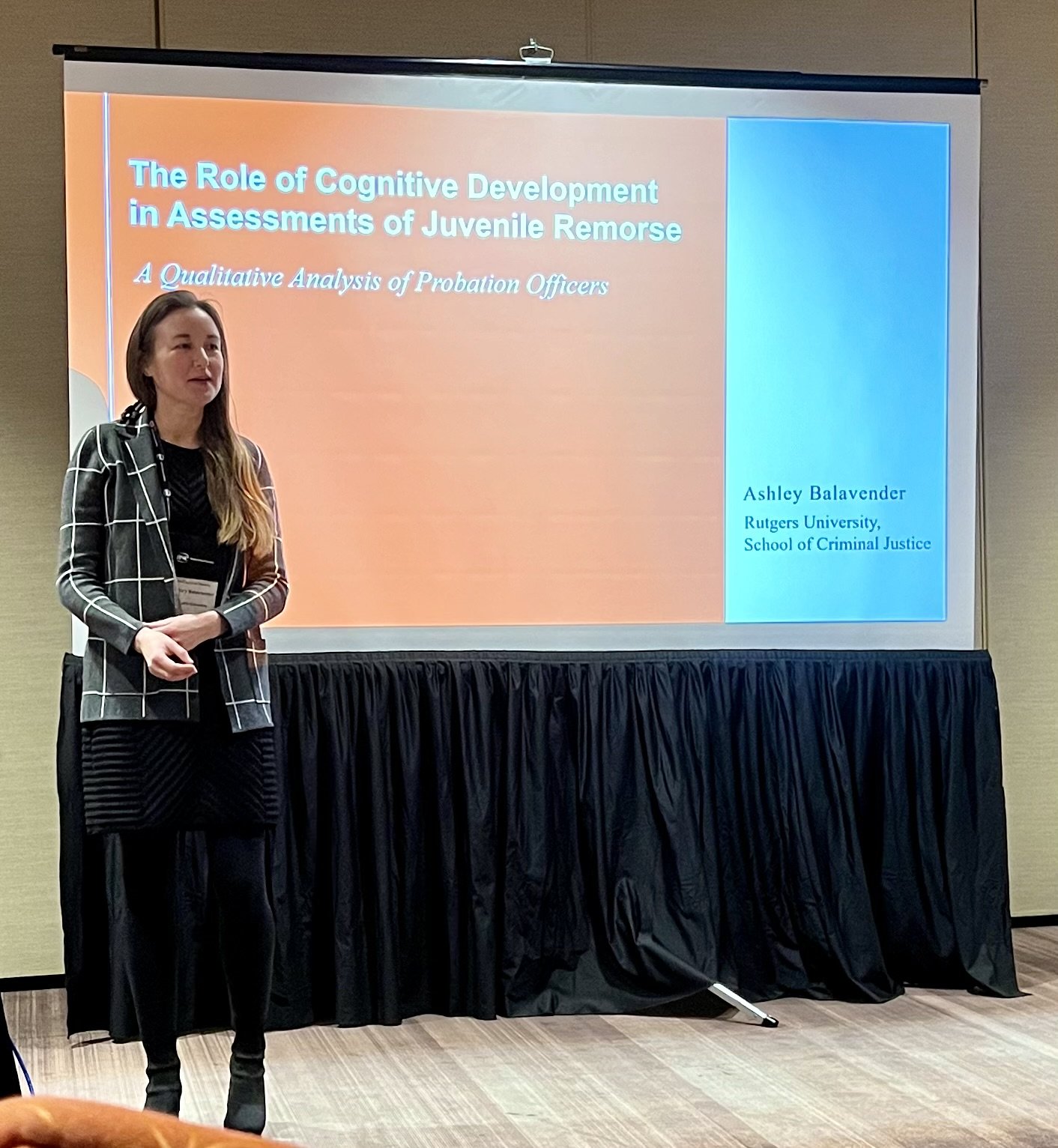
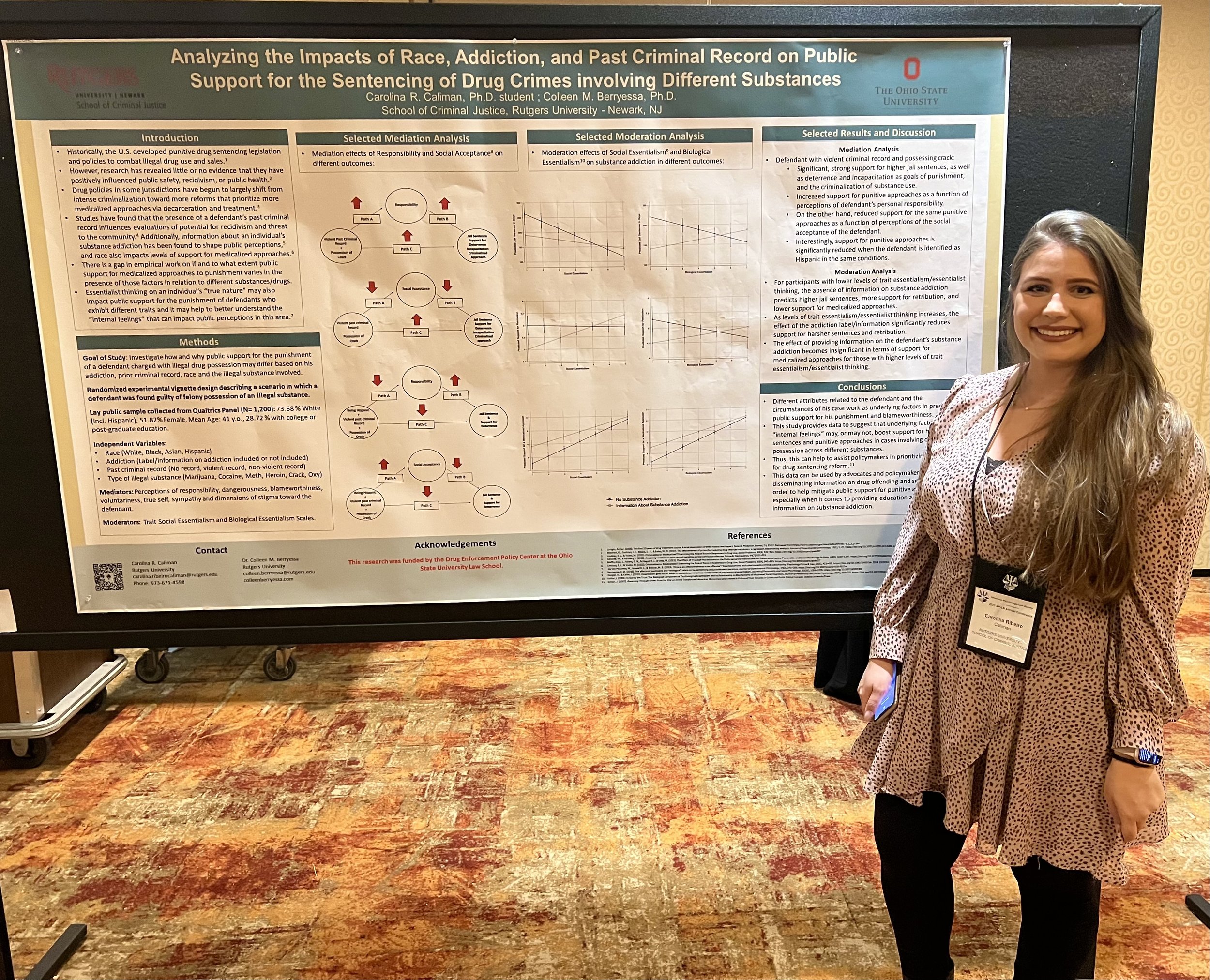







PH.D. STUDENTS
Penny Lowe
Penelope Lowe began as a Ph.D. student at the Rutgers School of Criminal Justice in Fall 2025. She received a B.S. from the University of Roehampton in Psychology and Criminal Justice in 2025.
Penelope’s interests include biopsychosocial criminology and justice policy, particularly in the interaction between micro- and macro-factors that impact decision-making within courts and sentencing.
Highlighted Work
P. Lowe, S. McManus, P. Asadi Zeidabadi, K.R. Thiara, R. Sumanta, E. Capelas Barbosa, and L. Hashemi. (2025). Black and minoritized women’s experiences of specialist domestic violence services in the United Kingdom (UK): A scoping review. Trauma, Violence, & Abuse. DOI: 10.1177/15248380251335038. Link
Tova Cohen
Tova Cohen began as a Ph.D. student at the Rutgers School of Criminal Justice in Fall 2025. She received a B.A. in Religious Studies from Scripps College in 2020 and an M.S. in Criminology and Criminal Justice from the University of Alabama in 2025.
Tova’s research interests include courtroom workgroups, jury decision-making and deliberation, pretrial release, and the future of online adjudication processes.
Highlighted Work
The Weight of the Last Vote: The Imposed Responsibility of the Pivotal Voter in American Juries, Master’s Thesis Project. Link
A. Lankford and T. Cohen. (2025). Mass Shooters and the Death Penalty: An Exploration of Sentencing Outcomes and Changes Over Time. Crime, Law, and Social Change, 83, 30. Link
I.A. Silver., T. Cohen, and J. Newsome. (2024). Juvenile Incarceration in an Adult Facility and Violent Victimization During Adulthood. Journal of Adolescence, 97(3), 850-860. Link
Madison Baczuk
Madison Baczuk began as a Ph.D. student at the Rutgers School of Criminal Justice in Fall 2024. She received B.A. degrees in criminology and criminal justice, communication, and philosophy from the University of Northern Colorado.
Madison's research interests include neurocriminology, biopsychosocial criminology, morality and ethics, international justice systems, corrections, and prison culture, adverse childhood experiences, and child welfare systems.
Highlighted Work
C.M. Berryessa, M. de Vel-Palumbo, C. Caliman, and M. Backzuk. (2026). Honesty as a “Communicative Tool” in Sentencing: A Study of Judges from the U.S. and Australia. Journal of Criminal Justice, 102, 102575. Link
Isabella Polito
Isabella Polito started as a Ph.D. student at the Rutgers School of Criminal Justice in Fall 2023. She received a B.A. in Criminology, Law, & Society and a B.A. in Psychological Science from the University of California, Irvine.
Isabella’s research interests include how the justice system responds to offending and juvenile delinquency–and how these responses sustain racial and economic inequalities as well as impact intergenerational opportunities and mobility. She particularly focuses on psychological factors involved in decisions that contribute to inequities in the legal system.
Highlighted Work
I. Polito and C.M. Berryessa. (2025). Politics in Policy: An Experimental Examination of Public Views Regarding Sentence Reductions via Second Chance Mechanisms. Law and Human Behavior. DOI: 10.1037/lhb0000605 Link
I. Polito and C.M. Berryessa. (2025). The Neurobiological and Psychological Nature of ‘Adultification’: Implications for Legal Decision-Making in Cases Involving Adolescents. In H.C. Chan & E. Svingen (Eds.), Youth Deviance, Crime, and Justice: The Neuro-Psycho-Criminological Perspective. West Sussex, UK: Wiley. Link
Emily Greberman
Emily Greberman started as a Ph.D. student at the Rutgers School of Criminal Justice in Fall 2022. She received a B.S. from Drexel University in Criminology & Justice Studies and Psychology, and a M.S. in Criminology from the University of Pennsylvania.
Emily’s research interests include corrections and carceral relationships, comparative justice, the use of social media by criminal justice institutions, and public health/drug policy.
Highlighted Work
E. Greberman, S. Andersen, C.M. Berryessa, and J. Hyatt. (2025). The Importance of Social Dynamics in a Prison Environment: Learning from the Concerns of Incarcerated People. Journal of Criminal Justice, 101, 102537. Link
E. Greberman and C.M. Berryessa. (2024). Drug Policy, Drug War, and Disparate Sentencing. In Oxford Research Encyclopedia of Criminology and Criminal Justice. Oxford, UK: Oxford University Press. DOI: 10.1093/acrefore/9780190264079.013.884. Link
E. Greberman, E. Kerrison, A. Chalfin, and J.M. Hyatt. (2024). Understanding Vaccine Hesitancy in US Prisons: Perspectives from a Statewide Survey of Incarcerated People. Vaccines, 12(6), 600. Link
Carolina Caliman
Carolina R. Caliman started as a Ph.D. student and Research Assistant at the Rutgers School of Criminal Justice in the Fall 2021. She received her Bachelor of Laws (LL.B.) from the Federal University of Espírito Santo, Brazil, and she is fluent in Portuguese (native speaker).
Carolina’s research interests focus on courts and sentencing, particularly investigating the perceptions and decision-making processes of courtroom actors. Her research also examines the intersection of law and psychology within different stages of the legal process, especially involving mental health and individuals with substance addiction, and its impacts on sentencing and public opinion.
Highlighted Work
C.R. Caliman and C.M. Berryessa. (2025). Legal Defense of Autistic Defendants in the US: A Qualitative Analysis of the Experiences of Legal Professionals. Journal of Social Issues, 81(4), e70034. Link
C.M. Berryessa and C.R. Caliman. (Forthcoming). How Neuroscience Can Improve the Sentencing of Defendants with Autism Spectrum Disorder. In H. Wishart and C.M. Berryessa (Eds.). Neuroscience in Criminal Justice Systems: The Positive Impact of Neurojustice. London, UK: Routledge. Link
C.R. Caliman and C.M. Berryessa. (2025). Analyzing the Impacts of Race, Addiction, Drug Type, and Criminal Record on Public Support for Criminalized and Medicalized Sentencing Approaches toward Illegal Drug Use. Journal of Experimental Criminology. DOI: 10.1007/s11292-024-09657-2 Link
C.R. Caliman and C.M. Berryessa. (2025). Legal Decision-makers in Criminal Cases involving Autism Spectrum Disorder: A Review of the Research and a Call for Action. In B. Bornstein and M.K. Miller, Advances in Psychology and Law (Vol. 7). Cham, Switzerland: Springer. Link
Ashley Balavender
Ashley Balavender started as a Ph.D. student and Part-Time Lecturer at the Rutgers School of Criminal Justice in Fall 2019. She received her B.A. in English Literature and Journalism from Brooklyn College. Prior to her studies, Ashley worked at the Center for Employment Opportunities, partnering with New York parole officers to help returning citizens find employment.
Ashley’s research interests are on community supervision and the perceptions and decision-making of justice system front-line staff. Her current research investigates the perceptions of probation officers regarding remorse in their clients, specifically related to the cognitive and behavioral development of young adults. She teaches undergraduate courses in Research Methods and Corrections.
Highlighted Work
C.M. Berryessa and A. Balavender. (2022). The Value of Remorse as a “Therapeutic Tool” for Probation Officers in Sentencing. In M. Perlin & K. Frailing (Eds.), The Therapeutic Jurisprudence Implications of Judicial Decision-Making by Non-Judicial Officers (pp. 68-80). Philadelphia, PA: Temple University Press. Link
LAB ALUMNI
Sandy Xie
Sandy Xie received her Ph.D. from the Rutgers School of Criminal Justice in 2025. She received her B.A. in Criminology with minors in Neuroscience and Sociology from the Pennsylvania State University and her M.S. in Criminology from the University of Pennsylvania.
Sandy’s research interests include neurocriminology, neuroethics, biopsychosocial criminology, law and responsibility, morality, bias and stigma, mental health in the criminal justice system, and public perceptions. She completed a three-study mixed-methods dissertation titled "Perceptions of Neuroscience and Mental Health in Courts: Implications of Bias, Stigma, and Other Factors on Defendant Outcomes."
Sandy is now a Research Scientist doing behavioral and qualitative work with the New Jersey Department of Corrections.
Highlighted Work
M. Thomaidou, C.M. Berryessa, and S. Xie. (2025). A Mixed-Methods Analysis of the Influence of Bio-Behavioral Scientific Evidence on U.S. Judges’ Reasoning and Sentencing Decision-Making. International Journal of Law and Psychiatry, 102, 102126. Link
M. Thomaidou, A. Patel, S. Xie, and C.M. Berryessa. (2024). Machine Learning Analysis of a National Sample of U.S. Case Law Involving Mental Health Evidence. Journal of Criminal Justice, 94, 102266. Link
S.S. Xie and C.M. Berryessa. (2024). The Effects of a Defendant’s Childhood Physical Abuse on Lay Support for Sentencing: The Moderating Role of Essentialism. Behavioral Sciences & the Law. DOI: 10.1002/bsl.2686. Link
S.S. Xie, C.M. Berryessa, and F. Focquaert. (2023). The Impact of Neuromorality on Punishment: Retribution or Rehabilitation?. In M. Altman (Ed.), Cham, Switzerland: The Palgrave Handbook on the Philosophy of Punishment (pp. 441-464). London, UK: Palgrave MacMillan. Link
Dr. Mia Thomaidou
Dr. Mia Thomaidou was a post-doctoral fellow, supervised by Dr. Colleen Berryessa, at Rutgers under a Rubicon Grant awarded by the Dutch Research Council (NWO) from Fall 2022 to Fall 2024. This project focused on bridging bio-behavioral and criminal justice and aims to understand how science is being used in criminal courts.
Mia received a BSc in cognitive neuroscience from the University of Westminster, London and Oxford University. She also has an MSc in Neuropsychology and an MSc in Crime and Criminal Justice. She completed her Ph.D. at Leiden University, in which she focused on the cognitive components of physical pain.
Mia is now a Neuroscience & Society Fellow for the Dana Foundation. Her website is https://www.miathomaidou.com/.
Highlighted Work
M. Thomaidou and C.M. Berryessa. (Forthcoming). Sentencing. In P. Zapf (Ed.), APA Handbook of Forensic Psychology (2nd Ed.) (pp. 549-579). Washington, DC: American Psychological Association. Link
M. Thomaidou, C.M. Berryessa, and S. Xie. (2025). A Mixed-Methods Analysis of the Influence of Bio-Behavioral Scientific Evidence on U.S. Judges’ Reasoning and Sentencing Decision-Making. International Journal of Law and Psychiatry, 102, 102126. Link
M. Thomaidou, A. Patel, S. Xie, and C.M. Berryessa. (2024). Machine Learning Analysis of a National Sample of U.S. Case Law Involving Mental Health Evidence. Journal of Criminal Justice. DOI: 10.1016/j.jcrimjus.2024.102266. Link
M. Thomaidou and C.M. Berryessa. (2024). Bio-behavioral Scientific Evidence Alters Judges’ Sentencing Decision-making: A Quantitative Analysis. International Journal of Law and Psychiatry. DOI: 10.1016/j.ijlp.2024.102007. Link
M. Thomaidou and C.M. Berryessa. (2023). Mental Illness as a Sentencing Determinant: A Comparative Case Law Analysis Based on a Machine Learning Approach. Criminal Justice and Behavior, 50(7), 976-995. Link
M. Thomaidou and C.M. Berryessa. (2022). A Jury of Scientists: Formal Education in Biobehavioral Sciences Reduces the Odds of Punitive Criminal Sentencing. Behavioral Sciences & the Law, 40(6), 787-817. Link
